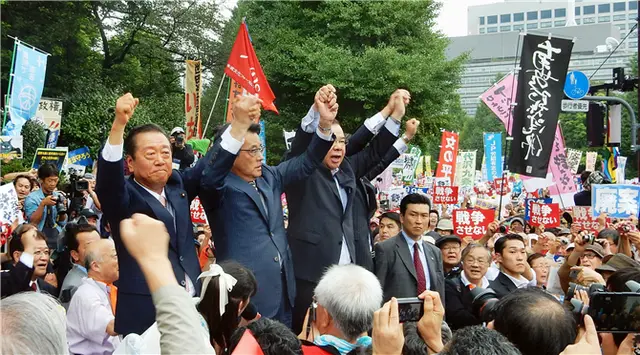A planned merger of the main opposition Democratic Party of Japan (DPJ) and the Japan Innovation Party (JIP) may be approved as early as Friday, representatives from both parties confirmed Wednesday.
The planned merger of the largest and third-largest opposition parties is aimed at bolstering the opposition camp's ability to take on the ruling Liberal Democratic Party of Japan (LDP) in the upper house elections this summer.
The LDP, led by Prime Minister Shinzo Abe, holds a majority in Japan's lower parliamentary caucus, but is eyeing increasing its power in the upper chamber, and, thereafter, forging ahead with a referendum to change the constitution.
The constitutional changes being tabled, specifically regard amending a key clause in Japan's war-renouncing constitution that will further broaden the operational scope of Japan's military forces.
Under the current Article 9 of the constitution, Japan is prohibited from maintaining ground, sea or air forces with war potential and is forbidden from using violence as a means of settling international disputes.
Abe said recently on a radio show broadcast here, however, that it had long been the wish of the LDP to revise the constitution.
But with DPJ President Katsuya Okada likely to head up the new opposition party to be launched in March and possibly under a new name, as yet to be decided, and with 150 parliamentarians from both chambers expected to join, executives have said that they plan to oust the current leadership.
At a meeting held earlier Wednesday by members of the JIP, its current leader explicitly laid out the intention behind the planned merger.
"What we aim for is a change of government," Yorihisa Matsuno said.
The merger announcement comes as recent media polls have shown that the support rate for Abe's cabinet has slumped of late following a series of scandals and gaffes by his ministers and senior representatives.
Most notably, former economics minister Akira Amari quitting for accepting bribes from a construction company in return for political favors, dismayed the public, as did LDP lawmaker Kensuke Miyazaki stepping down after it was revealed he was having an extra marital affair with a model that continued during his wife's pregnancy. His wife was also a member of parliament.
Abe's Internal Affairs and Communications Minister Sanae Takaichi stating that broadcast media outlets could be forced to cancel programs or discontinue their operations if their programs recurrently presented views deemed politically biased and ignore official calls to remain "politically neutral," as stipulated in the broadcasting law, also drew a backlash from the public.
The majority of citizens polled said that Takaichi's comments were a direct threat to freedom of speech as well as media freedom.
Nationwide demonstrations, including hundreds of thousands descending on the Diet building towards the end of last year, in addition, indicated that a vast number of the Japanese public are opposed to the recent Abe-led security shift and wish to see the peace-preserving Article 9 of Japan's Constitution upheld.
 简体中文
简体中文

